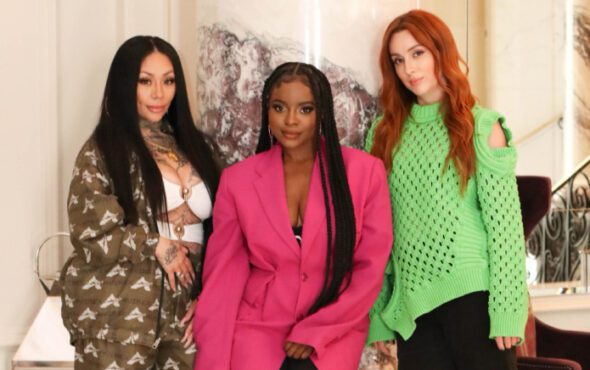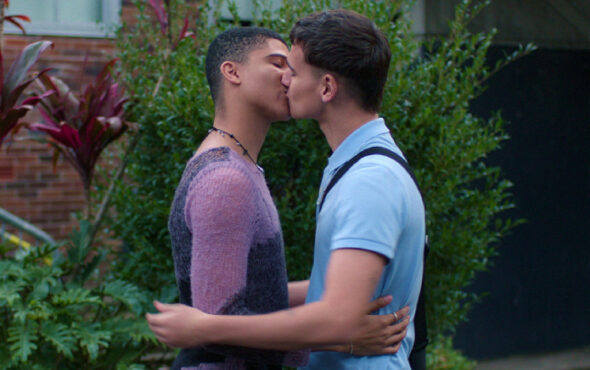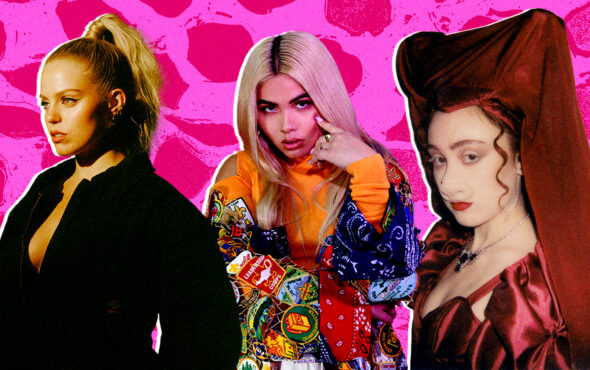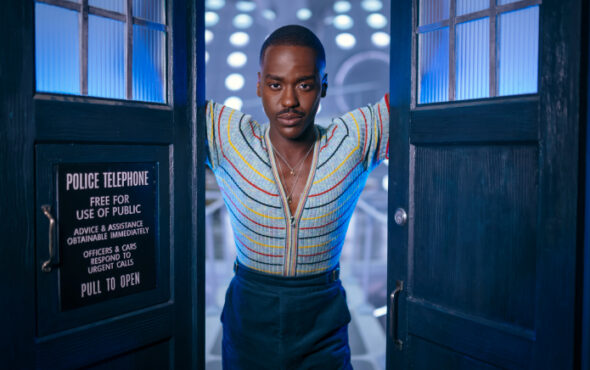
The Sugababes have praised their LGBTQ+ fanbase for their continuous ‘honesty, love and support’.
The original trio, which consists of Siobhan Donaghy, Mutya Buena and Keisha Buchanan, reunited for their first performance in nine years at Mighty Hoopla (4 June) – one of London’s most popular pop music festivals for the queer community.
As one of the most commercially successful girl bands in history, their incredible set included a plethora of iconic classics such as Overload, Freak Like Me, Push the Button, Too Lost in You, Round Round and About You Now.
Their performance was met with overwhelming praise from critics and longtime fans, with one tweeting: “Just gonna say it, that was the best concert in my life.”
“This was EPIC! Smashed it out the park, and then some,” another wrote, accompanied by several rainbow-coloured emojis.
Speaking with GAY TIMES, Keisha admits that the band weren’t fully aware of their popularity within the LGBTQ+ community until they reunited in 2012 as ‘Mutya Keisha Siobhan’ (shortened to ‘MKS’) with the critically-acclaimed track Flatline.
Although the Sugababes “knew” they had gay supporters after years of performing at LGBTQ+ bars and clubs, Keisha says “it was clearer to us when we first came back with MKS. I remember our fanbase was always older than us.
“I do remember there were a lot of guys and stuff, but obviously when you’re younger you just think they all have crushes on you. Maybe they did, I don’t know! I feel like it’s actually a very big LGBTQ+ fanbase. I see it now.”
Mutya, who landed two major solo hits when she departed the group in 2005 with Real Girl and the Groove Armada-assisted Song 4 Mutya (Out of Control), reveals that she “only” performs as a solo artist in LGBTQ+ spaces.
“I’m actually really scared of doing straight clubs by myself, so I always say no unless it’s gay. I find the honesty and the love and support is so much more bigger,” she admits. Siobhan agrees, saying LGBTQ+ people have a greater appreciation for pop music.
“I feel like the straights do [appreciate pop music], but I feel like there’s a vibe,” says Keisha. “When you go into an LGBTQ+ space, there’s a vibe you don’t get anywhere else… Now that we’re seeing that the majority of our fans are from a specific community, it’s almost like we’ve grown up together.”
Headlining @mightyhoopla on Saturday was incredible! Thank you to everyone who came out to watch and support us, still on cloud 9♥️ pic.twitter.com/X4h48g7sXD
— Sugababes (@Sugababes) June 6, 2022
Seven years after they reunited as MKS, the Sugababes legally reclaimed their name and released their first music together as a trio since their 2000 debut album One Touch with the DJ Spoony-produced track Flowers.
To mark the 20th anniversary of their aforementioned debut, which still stands as their most lauded piece of work, the band also re-issued the album with unreleased demos, B-Sides and new remixes. One Touch, which originally stalled at 26 on the UK Albums Chart, later re-peaked and made its first appearance in the top 20 at number 18.
Siobhan tells GAY TIMES that the album has stood the test of time because of its authenticity, live instrumentation and “coming-of-age” themes, while Keisha says the album was a perfect representation of their individual personalities.
“It’s nice to know that, with our music, you can listen to it in the next 20 years and say, ‘It sounds so current,’” says Mutya. “I just don’t know anyone that says, ‘Oh god, it’s so old.’ Everyone seems to have such good things to say about One Touch.”
The trio acknowledge that the music industry has “progressed” since they released the album, with Keisha reminiscing on a recent photoshoot with The Sunday Times that boasted “all women” and “people of colour” on the set.
“We walked in, and it was the first time in my entire career that it was all women. Apart from the photographer, everywhere in there was of colour. It felt nice because you feel… seen?” says Keisha, who has spoken at large about her experiences with racial microaggressions throughout her original time in the Sugababes.
“I did this whole reaction video in 2020 on my YouTube channel reacting to interviews, and I didn’t notice how bad it was,” Keisha says. “You’d walk in and they’d say, in every single interview, ‘Are you scared of her?’ Even when we were having the best conversation, it would turn into a character thing.”
While “times have changed for all of us,” Keisha recognises how women still face prevalent discrimination and under-recognition in the music industry, especially when they “stand up” for themselves “in the most miniature way”.
“It can be as simple as going, ‘I thought you said you were going to charge me £500 and it’s now £5000?’ ‘Oh, she’s difficult,’” Keisha continues.
“Look at what we’ve been through since we came back. There was so much stuff that happened behind-the-scenes. We had to literally fight and go up against so much oppression just to get the name back and have a voice.
“We are not going to follow through with the narrative of what people may think, the people who are trying to obstruct us. We are fighting back, being progressive and not throwing the towel in. It does feel like now is the right time.”
The Sugababes originally planned to release new material in 2020, but their plans were derailed as a result of the coronavirus pandemic. Since then, the band have primarily focused on the live aspect of their comeback with their performance at Mighty Hoopla and their highly-publicised set at this year’s Glastonbury Festival.
“It hasn’t been possible to be in the studio. It’s insane,” Siobhan tells us. “Our worry is that the summer shows will lead into the creative and building of the tour, so we’re trying to work out our schedule.”
In June, it was announced that Sugababes will embark on a seventeen-date UK wide tour later this year, which kicks off in Bristol on Sunday 16 October. Tickets went on sale Friday 1 July via LiveNation.co.uk.
“We’re so excited to come full circle and announce our own headline tour,” they said in a statement. “We’ll be hitting the road in October and November – can’t wait to see you all there.”



